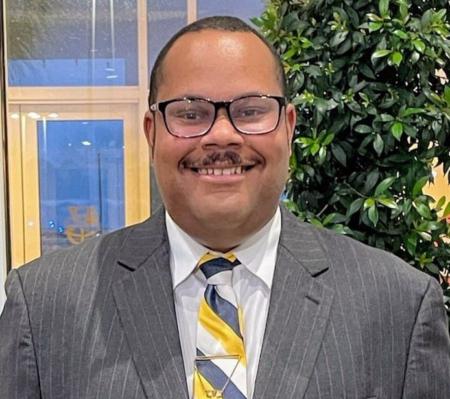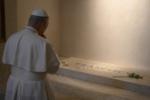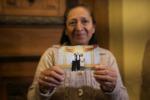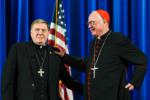Survivor says new pope was ally in struggle against controversial movement
VATICAN CITY (CNS) -- Among the thousands of pilgrims along the main road leading to St. Peter's Square waiting anxiously for signs of smoke from the Sistine Chapel chimney was journalist and abuse survivor Pedro Salinas.
When he saw the white smoke on one of the giant video screens along Via della Conciliazione, Salinas and fellow journalist Paola Ugaz ran up the square to hear French Cardinal Dominique Mamberti announce the name of the new pope.
"Then he said, 'Robert Francis.' I wasn't sure if it was real or if I had imagined it," Salinas told Catholic News Service. "Once he said 'Prevost,' (Paola) let out a scream like I never heard before. Everyone around us was startled, and I had to take her to the side. We were both in shock. It was a powerful emotional moment for both of us."
Sitting in a café May 9, wearing a white T-shirt as he sipped on a double espresso, Salinas pointed to his shirt, saying, "I always dress in black and for this trip here, I said to myself: 'I'm bringing this white shirt, and if Prevost wins, I'm wearing it.'"
"I thought I was most likely going to use it as a pajama top, but then he won the election, and in record time!" he told CNS.
Salinas, a former member of Sodalitium Christianae Vitae, suffered physical and psychological abuse at the hands of Luis Fernando Figari, the Catholic movement's founder, in 1971.
Salinas and Ugaz co-authored a book titled, "Mitad Monjes, Mitad Soldados" ("Half Monks, Half Soldiers"), which detailed the psychological and sexual abuse, as well as corporal punishment and extreme exercises that young members of Sodalitium Christianae Vitae were forced to endure.
For years, Salinas told CNS, the two received little support from most of Peru's bishops, with the exception of a few.
"I can count on one hand the bishops who supported us," Salinas said.
Then-Bishop Robert Prevost, who led the Diocese of Chiclayo from 2015 to 2023, was one of them, as well as four others, including Cardinal Pedro Barreto Jimeno, president of the Ecclesial Conference of the Amazon Region and archbishop emeritus of Huancayo, and Cardinal Carlos Castillo Mattasoglio of Lima, Peru.
"The rest of the bishops, like (Cardinal Juan Luis) Cipriani, for example, never moved a finger for victims. It was always, 'We must defend the institution,'" Salinas said.
The presence of Cardinal Cipriani, the retired archbishop of Lima, at the cardinals' meetings before the conclave drew heavy criticism. In January, following a report by the Spanish newspaper El Pais, Vatican spokesman Matteo Bruni confirmed that disciplinary measures against Cardinal Cipriani were still in effect after he was accused of abusing an unnamed victim in 1983. The cardinal has denied the allegations.
Salinas told CNS that in 2019, then-Bishop Prevost played a crucial role his legal troubles with retired Archbishop Jose Eguren Anselmi of Piura.
Archbishop Eguren, a professed member of Sodalitium since 1981, filed a lawsuit against Salinas after he wrote a 2018 article accusing the prelate of having known about the abuse. He also filed a separate lawsuit against Ugaz for her participation in a documentary in which she made similar accusations against the bishop.
After the court ruled in his favor, Archbishop Eguren unexpectedly withdrew his defamation suit. Bishops in the country distanced themselves from the lawsuit and said the church needed the help of journalists and survivors of clergy sex abuse to overcome the current crisis.
Following the results of a "special mission" to investigate abuses within Sodalitium commissioned by Pope Francis, the Vatican announced the expulsion of several members from the controversial movement, including Archbishop Eguren.
Both Salinas and Ugaz, thanked Archbishop Charles J. Scicluna of Malta and Msgr. Jordi Bertomeu, officials of the Dicastery for the Doctrine of the Faith, as well as Pope Francis and his future successor for "bringing hope to survivors."
Pope Francis suppressed the movement at the end of January, just weeks before he was hospitalized, and Pope Leo "played a crucial role in this entire history," Salinas said.
"I know he met with (Pope Francis) every Saturday and that there was a trusting relationship" between the two of them, he said.
Regarding the new pope's election, Salinas told CNS that while then-Cardinal Prevost was "always my candidate" for pope, he always felt that it was unlikely to happen.
The Peruvian journalist said he believes that Pope Leo will continue some aspects of Pope Francis' papacy, "but with a different style."
"I think that's logical," Salinas said. "He doesn't have to imitate (Pope Francis). And of course, the characteristics of (Pope Leo's) personality are of a person who is more discreet, simple, helpful."
"In Chiclayo, we saw how the people loved him for being a good shepherd. But I've also seen when he's given a responsibility and how he exercises his authority. And I think he is good," he said.



















